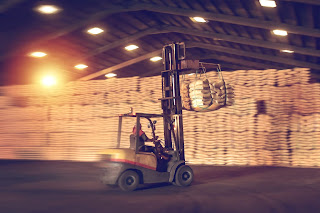5 Commonly Used Order Picking Methods for Warehouses of All Sizes
When
orders start flowing in exponentially and you run short on time, simply adding
more labor to your warehouse might seem like a quick & logical solution.
However, this might be nothing more than a temporary fix, especially when the
growth is just an occasional spurt. With steadily increasing customer demands,
sustaining efficient operations in the long run becomes critical to a
well-functioning warehouse. Avoiding bottlenecks, ensuring accurate orders, and
keeping up with customer expectations regarding shipping times becomes a lot
more productive if you’re using the right methods & machinery in order
picking. It is only when you execute absolute efficiency in order accuracy and
timely order fulfillment, can you retain a customer. Here are 5 ways in which
you can extract more out of your existing manpower by simply changing the way
your order
picker works.
- Single Order
Picking
- One of the most
basic methods, a picker works on a single order at a time using machinery
like a pickup truck or a reach truck.
- Each item is
sorted and found out in the warehouse one-by-one in order to complete the
respective order.
- This requires the worker to tread along the same route multiple times, thereby, reducing their efficiency.
Recommended for: Smaller warehouses with limited orders and smaller volumes.
1. Batch Order Picking
- The batch picking
method combines products for multiple orders into one pick instruction so
the pickers can execute the work on multiple orders in a single time
slot.
- Rather than
handling each order individually, a worker will pick all of the
SKUs(items) required for the ‘x’ number of orders they are assigned,
combine them and bring them all to a dedicated sorting area.
- Typically, the
order picker uses a multi-tiered pickup-cart to carry a different tote and
carton on a cart of each shipment.
Recommended for: Warehouses with lots of SKUs and multi-product orders.
1. Zone Order Picking
- In this system,
the warehouse is split into various zones.
- The work is
uniformly divided amongst the pickers who are assigned their respective
zones from where they must procure SKUs for various orders at a time.
- In a slight variant called the “pick and pass method”, carts are transferred from one area to another as the selection from the previous zone is completed.
Recommended for: Warehouses that deal with high volume inventories and picker congestion.
1. Wave Order Picking
- This method is
similar to batch picking, except that orders to be picked are assigned in
‘waves’ throughout the day.
- Wave picking allows warehouses to organize their operations in a way that takes factors like labor and transport schedules into consideration. Workers pick goods at the most optimal times, resulting in highly efficient operations.
Recommended for: Companies that have a higher number of picks with respect to each order.
1. Cluster Order Picking
- In this method,
workers/order pickers are assigned clusters/groups.
- A single order
picker will cater to multiple orders simultaneously.
- A worker will
typically go around the entire warehouse loading items into a cart that
contains multiple order containers.
- Instead of
focusing on limited SKUs for several orders, pickers get to pick multiple
items for limited orders.
- A cluster picking operation requires a sophisticated warehouse management system to ensure clusters are scheduled and assigned properly. The efficiency of Cluster picking is only as good as the system running it.
Recommended for: Increasing the number of goods shipped to customers on a given day.
Equipments to speed up the operation
Order picking, an otherwise strenuous
and time-consuming job, can be greatly eased with the help of right equipments.
Automated machineries such as the electric stacker
or a diesel
forklift can make a great difference in your order picking
process. Using the right Material Handling Equipments, such as those from Linde
MHE, makes for faster picking times, enhanced accuracy & recurring
business. If you are not sure which equipment is the best choice for your
particular needs, contact Linde MHE and
we will gladly help you decide for yourself.


Comments
Post a Comment